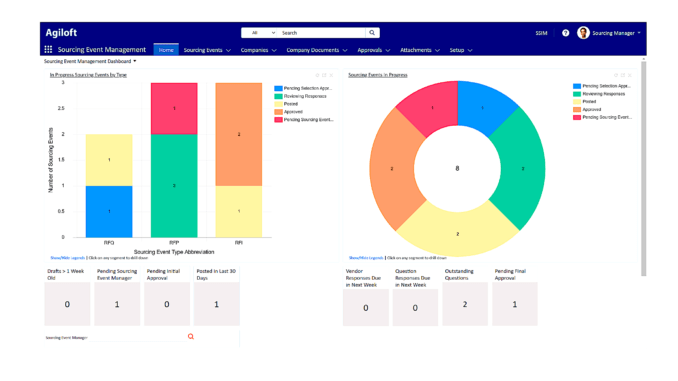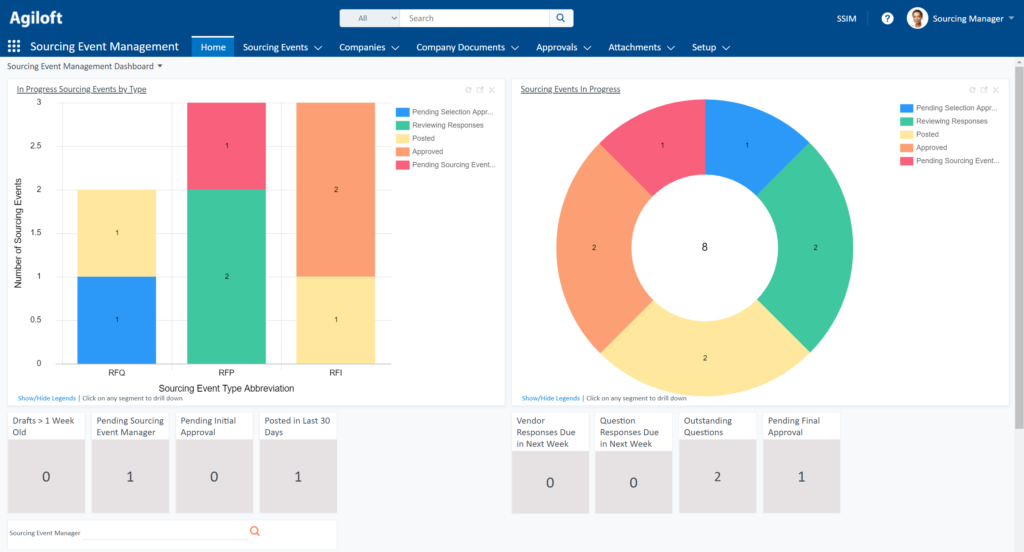
CLM platform, Agiloft, has extended its capabilities with the launch of a new Sourcing and Supplier Information Management module. It’s the second major product launch that Andy Wishart, Chief Product Officer (CPO), who joined from Thomson Reuters in January, has played a key role in.
To put it simply, the idea has been to create a single, CLM-integrated system for companies to handle supplier contracting, and in turn give suppliers an easy way, via a portal, to engage with a company’s needs covering a range of issues, including compliance. The output of these contracts then connects to the broader CLM platform and can be viewed in a dashboard (see below).

The project had existed before Wishart joined, but now he is leading on its roll-out given his CPO role. The other major launch since January was the new user interface and enhanced AI for contract analysis, which came out in March.
The core attributes (among others) are:
- ‘Create standardised templates with pre-approved language for RFIs, RFPs, and RFQs.
- Allow stakeholders to appraise, score, and compare suppliers for their projects.
- Convert awards into contracts with the click of a button, using approved terms and conditions.
- Compile data to verify compliance with business criteria and policies.
- Get alerts for upcoming expirations and identify a pipeline of new sourcing opportunities.’
As Wishart explained to Artificial Lawyer: ‘We are solving a real problem here and we interviewed many companies to understand their needs. [The key thing here] is that this is an ‘add-on’ to the CLM, it’s built on the same CLM core platform, but it benefits the customers in different ways.’

Wishart was especially focused on the fact that this was not a separate strand of Agiloft, and was part of the whole, so there was no context switching.
He also underlined the importance of having a ‘one click process to initiate the contract request’ after a supplier had met a company’s requirements. I.e. the information needed for the deal to be completed is then whisked off to the contract team at the company, all in a single, connected process.
In short, it’s hoped this will smooth out and make more efficient the entire process around how corporates contract with their suppliers. And, as mentioned, it will also generate more useful data for the business.
Wishart added that this was all part of the Agiloft philosophy, which is centred on the idea that ‘we want to elevate the importance of contracts, [so that they are] seen as a first class data record for the enterprise‘.
This is because contracts are connected to every part of the business, and so Agiloft is focused on providing a ‘cross functional’ approach. Having a special module for suppliers fits right into their strategy.
And, on the supplier side, he stressed the value of having a ‘portal experience’ where all the data needed could be provided to the corporate and then flow through to where it was needed.
This avoids the endless back and forth of emails asking for information, and then not having an integrated view of that data when it’s finally collected.
All in all a comprehensive package that fits into the wider strategy of seeing everything a business does that involves some kind of commercial agreement as connected to the CLM. This then means that the CLM platform isn’t just an under-used appendage of the inhouse legal team, but a central part of the whole business’s data architecture, operating at an enterprise level.
In an additional statement, Eric Laughlin, Agiloft CEO, commented: ‘As the first of many add-on modules extending CLM to adjacent processes, we are continually increasing the value of Agiloft CLM for the enterprise.’
‘As the only CLM platform to provide no-code AI capabilities, Agiloft offers unmatched possibilities for customisation and automation of complex contract and commercial workflows—all without needing to write a single line of code. The new capabilities of this latest release take CLM to the next level, helping sourcing and supplier management deliver more business impact.’